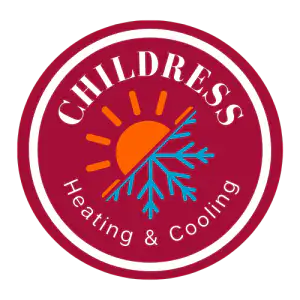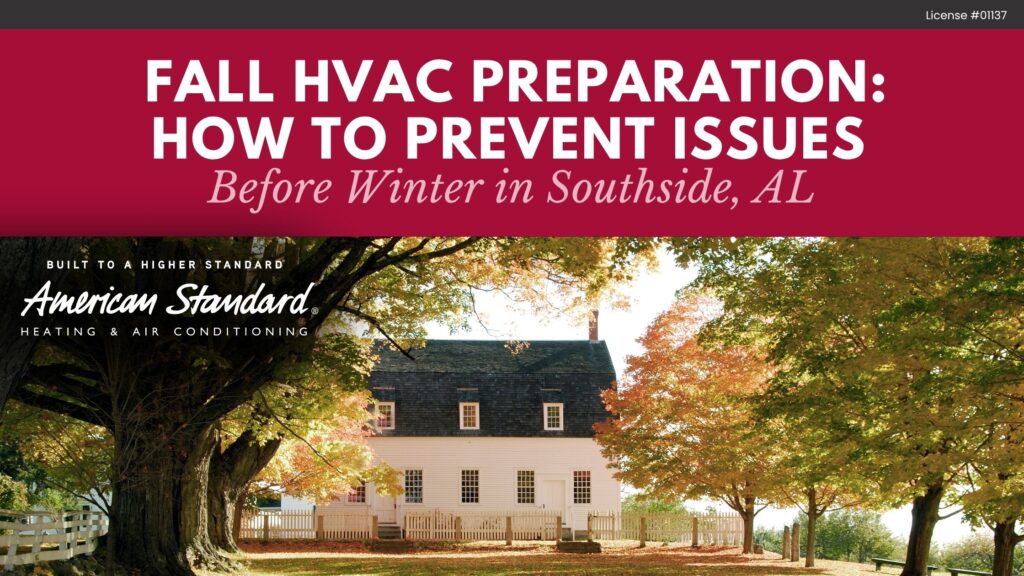Fall HVAC Preparation: How to Prevent Issues Before Winter in Southside, AL
As the leaves change color and cooler temperatures set in across Southside, Gadsden, and Etowah County, it’s the perfect time to prepare your home’s heating and cooling system for the fall season. Your HVAC system has worked hard all summer, and now it’s shifting into heating mode. Without proper maintenance, common HVAC problems can arise, leading to unexpected breakdowns, higher energy bills, and uncomfortable indoor conditions.
At Childress Heating & Cooling, we’ve served our community for over 20 years, helping homeowners ensure their HVAC systems run efficiently year-round. In this guide, we’ll walk you through the key HVAC issues to watch for this fall and practical steps you can take to prevent them—so your home stays safe, cozy, and energy-efficient.
Why Fall HVAC Maintenance Is Critical
Fall is more than just pumpkin spice season—it’s a transitional period for your HVAC system. During this time:
- Your system switches from cooling mode to heating mode.
- Dust, debris, and allergens can accumulate during summer.
- Early winter can bring fluctuating temperatures that strain older or neglected equipment.
Proper fall preparation ensures your system:
- Maintains optimal indoor comfort.
- Operates efficiently, lowering energy costs.
- Avoids emergency repairs during the cold months.
- Improves indoor air quality and safety.
By tackling potential issues now, you’ll prevent costly repairs later and extend the lifespan of your HVAC system.
1. Check and Replace Air Filters
A clean air filter is essential for both efficiency and air quality. A clogged filter restricts airflow, forcing your system to work harder and potentially causing overheating or uneven heating.
Steps to prevent issues:
- Inspect your filter at least once a month during fall.
- Replace disposable filters every 1–3 months.
- Clean reusable filters according to the manufacturer’s instructions.
- Consider using a high-efficiency filter if someone in the home has allergies.
HVAC Tip: A clean filter not only protects your system but also improves indoor air quality during the months when windows remain closed.
2. Schedule a Professional Fall Inspection
Even if your system seems fine, a professional inspection can catch hidden problems early. During a fall tune-up, a certified technician will:
- Inspect and clean the furnace or heat pump.
- Test the thermostat for accuracy.
- Check electrical connections, ductwork, and safety controls.
- Identify carbon monoxide leaks and other safety hazards.
Local Advantage: At Childress Heating & Cooling, our technicians are trained to work on American Standard systems and other brands commonly found in Southside and surrounding areas. A professional tune-up ensures your system is ready for consistent fall and winter comfort.
3. Inspect and Seal Ductwork
Leaky or poorly insulated ducts can result in uneven temperatures and wasted energy. During your fall preparation:
- Inspect ductwork for leaks, gaps, or disconnected sections.
- Seal minor leaks with mastic or metal tape.
- Insulate ducts in unconditioned spaces to reduce heat loss.
Energy Tip: Proper duct maintenance can reduce heating costs by up to 20%, ensuring your home stays warm without overloading your HVAC system.
4. Test and Adjust Your Thermostat
Thermostat issues can lead to inconsistent temperatures or unnecessary energy use. During fall:
- Check that your thermostat reads accurately.
- Program your thermostat to match your schedule for efficient heating.
- Consider upgrading to a smart thermostat to control heating remotely and adjust settings automatically.
Efficiency Tip: Smart thermostats allow you to maintain comfort while reducing energy bills—perfect for homeowners who want precise control without manual adjustments.
5. Clear Your Outdoor HVAC Equipment
For homes with heat pumps or furnaces that have outdoor components, fall is the time to:
- Remove leaves, debris, and dirt from around the unit.
- Trim back plants, bushes, and other obstructions at least two feet from equipment.
- Inspect for physical damage or signs of wear.
Pro Tip: Clear airflow around outdoor units reduces stress on your system and prevents costly repairs as temperatures drop.
6. Monitor Indoor Humidity Levels
Cooler weather often brings dry air, which can cause discomfort, dry skin, and static electricity. Proper humidity management benefits both comfort and your HVAC system:
- Keep indoor humidity between 30–50%.
- Use a whole-home humidifier if your system supports it.
- Portable humidifiers can be used in smaller spaces.
Health Note: Maintaining proper humidity also helps prevent cracks in wood floors and furniture, while improving indoor air quality.
7. Check for Uneven Heating or Cold Spots
Uneven heating can indicate issues like duct leaks, clogged filters, or failing components. Walk through your home to:
- Identify rooms that feel colder than others.
- Ensure vents are unobstructed by furniture or décor.
- Schedule a professional inspection if inconsistencies persist.
Childress Insight: Our technicians can perform a diagnostic assessment to pinpoint airflow issues and ensure every room stays comfortably warm.
8. Inspect Safety Controls and Carbon Monoxide Detectors
Fall is the season when heating systems ramp up, so safety is crucial:
- Test smoke alarms and carbon monoxide detectors.
- Check that all safety switches on your furnace are operational.
- Have your heating system inspected for potential CO leaks by a professional.
Peace of Mind: A safe system is a comfortable system. These precautions protect your family while keeping your HVAC running efficiently.
9. Prepare for Emergency Situations
Despite preventive measures, HVAC issues can still arise. Be ready:
- Keep emergency contact numbers for trusted technicians.
- Know where your furnace shut-off switch is located.
- Have portable space heaters or blankets ready (used safely).
Local Expertise: Childress Heating & Cooling offers emergency services throughout Southside and Etowah County—ensuring you stay warm no matter what the weather brings.
Bonus Tips to Maximize Comfort and Efficiency
- Close fireplace dampers when not in use to prevent heat loss.
- Use heavy curtains or insulated window treatments to maintain warmth.
- Seal gaps around doors and windows with weatherstripping.
- Keep vents, radiators, and air registers clear for proper airflow.
These simple steps work hand-in-hand with your HVAC system to maintain comfort without increasing energy costs.
Frequently Asked Questions (FAQs)
Q1: How often should I schedule HVAC maintenance?
A: Ideally, schedule maintenance twice a year—once in the spring for cooling and once in the fall for heating.
Q2: How do I know if my heating system needs repair?
A: Watch for unusual noises, frequent cycling, uneven heating, higher bills, or odors from the system.
Q3: Can I do HVAC preparation myself?
A: Homeowners can change filters and clear debris, but professional tune-ups ensure safety and system efficiency.
Q4: How can I improve indoor air quality in fall?
A: Regular filter changes, duct inspection, and proper humidity control help maintain healthy air.
Q5: When should I consider replacing my HVAC system?
A: If your system is over 15 years old, breaks down often, or energy bills continue to rise despite maintenance, it may be time to replace it.
Contact Us
Childress Heating & Cooling is your local American Standard Customer Care dealer serving Southside, Gadsden, and Etowah County communities for over 20 years.
- If your home’s comfort system needs attention, or if you believe you might need a new HVAC system, call us or visit our website.
- We’re proud to be our community’s #1 choice when it comes to heating and cooling.
Phone: (256) 312-1893
Email: [email protected]
Website: Childress Heating and Cooling
Follow Us on Social Media:
- Facebook: Childress HVAC
- Instagram: @childresshvac
- Pinterest: Childress Heating and Cooling

